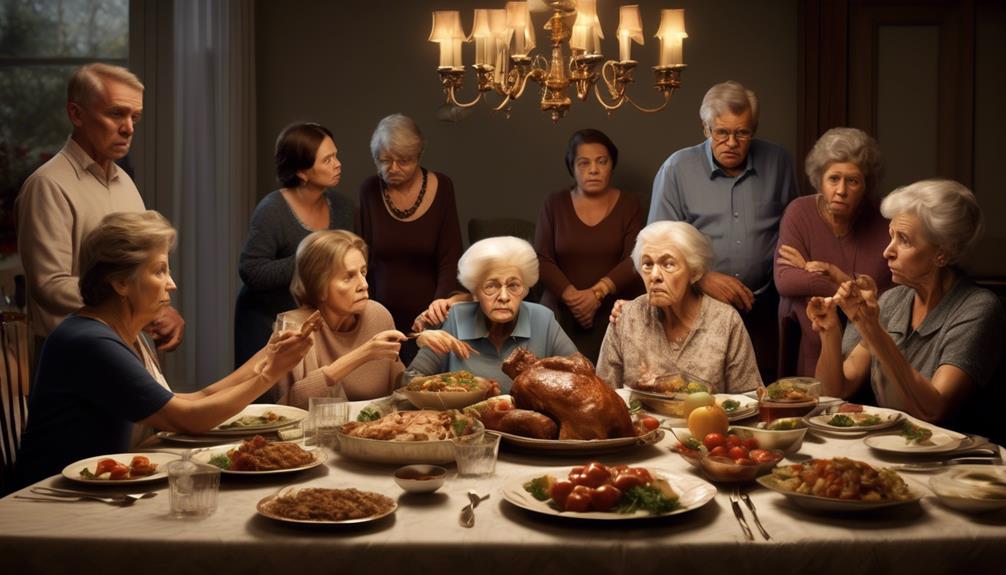Have you ever thought about how Borderline Personality Disorder (BPD) presents in elderly mothers?
The complexities of navigating this situation can be overwhelming, but understanding the unique challenges that come with aging and BPD is crucial for effective support and care.
As we explore the impact of BPD on elderly mothers and their families, it becomes evident that tailored strategies and approaches are essential for maintaining healthy relationships and promoting emotional well-being.
The journey of supporting an elderly mother with BPD is multifaceted, and finding ways to address these complexities is key to fostering a positive and sustainable caregiving environment.
Key Takeaways
- Independence struggles in aging individuals with BPD
- Establishing boundaries crucial for family dynamics
- Encouraging therapy and professional help is beneficial
- Balancing empathy and self-care when supporting elderly loved ones
Challenges of Aging With BPD
Aging individuals with Borderline Personality Disorder often face significant challenges in maintaining their independence and autonomy as they navigate the complexities of growing older. For those with a BPD mother, setting boundaries becomes crucial as the aging dynamics evolve. It's common for individuals with BPD to resist planning for their care, expecting family members to provide unwavering support. However, failing to establish boundaries can lead to imbalance and strain in the relationship.
As our BPD mother ages, the caregiving changes required can be overwhelming. Encouraging acceptance of these necessary changes is essential to ensure proper care and support. Avoiding discussions around aging dynamics with a BPD mother can limit care options and increase risks. Embracing these challenges with empathy and understanding can help maintain autonomy for the aging individual with BPD while ensuring their well-being.
In this journey, acknowledging the unique aspects of BPD and aging is vital for a harmonious transition into this new phase of life.
Impact on Family Dynamics

Living with an elderly mother with Borderline Personality Disorder can significantly impact family dynamics, leading to unpredictable and unstable relationships.
The presence of BPD symptoms in the mother can create emotional turmoil within the family, as her fear of abandonment and intense emotions often result in constant conflict.
Establishing healthy boundaries becomes a challenge for family members, as the mother's erratic behavior stemming from BPD can disrupt stability.
This ongoing instability can have detrimental effects on the emotional well-being of all family members, especially the children, who may struggle with feelings of guilt, shame, and confusion in the family dynamic.
The need to navigate these complex dynamics while ensuring the mother receives appropriate care adds an additional layer of stress to the family unit.
Addressing these challenges and finding ways to support healthy development within the family structure is crucial in managing the impact of an elderly mother with BPD.
Supporting an Elderly Loved One
Supporting an elderly loved one with borderline personality disorder requires a delicate balance of empathy, clear boundaries, and proactive involvement in their mental health journey. When dealing with an elderly mother with BPD, setting boundaries is essential to protect both parties' emotional well-being. It's crucial to offer emotional support while also ensuring that these boundaries are respected to maintain a healthy relationship.
Encouraging therapy for the elderly mother can provide her with tools to manage symptoms effectively. Seeking professional help can further support her in improving her overall well-being. Understanding the complexities of BPD in the elderly through education can enhance communication and caregiving strategies.
Additionally, prioritizing self-care for both the caregiver and the elderly loved one is vital in navigating the challenges that come with BPD. By combining empathy, clear boundaries, therapy, understanding, and self-care, one can provide optimal support for an elderly mother with borderline personality disorder.
Strategies for Managing Emotions

To effectively manage emotions when interacting with an elderly mother with borderline personality disorder, practicing mindfulness and utilizing deep breathing exercises can be beneficial. By incorporating these coping strategies, individuals can enhance emotional regulation and mental health outcomes.
Grounding techniques, such as focusing on the present moment, are also valuable in preventing overwhelming feelings during challenging interactions. Using validating language and active listening can help acknowledge the mother's emotions while maintaining personal boundaries and emotional well-being.
Setting clear boundaries and assertively communicating them is essential for navigating emotional dynamics effectively. Seeking support from a therapist or a support group can further aid in developing healthy coping mechanisms and strategies to manage emotions when interacting with an elderly mother with borderline personality disorder.
Navigating Relationships
Navigating relationships with an elderly mother who has borderline personality disorder requires a delicate balance of setting boundaries, effective communication, and self-care practices. Setting clear and firm boundaries is crucial to establish limits and protect one's well-being when interacting with a mother with BPD. Utilizing communication strategies like 'I' statements and active listening can facilitate more constructive dialogues and minimize conflicts. Balancing empathy and self-care is essential to prevent emotional burnout and maintain a healthy relationship with an elderly mother who struggles with BPD. Seeking professional guidance, such as therapy or counseling, can offer valuable insights and tools for navigating complex relationships with a mother with BPD. Understanding the impact of BPD on behavior and emotions enables individuals to approach interactions with empathy and informed understanding.
| Strategies | Description | Importance |
|---|---|---|
| Set Boundaries | Establish clear limits to protect well-being and maintain healthy interactions with the elderly mother | Crucial |
| Communication | Use 'I' statements and active listening to enhance dialogue and minimize conflicts | Essential |
| Empathy | Balance understanding with self-care to prevent emotional exhaustion | Vital |
| Professional Guidance | Seek therapy or counseling for valuable tools and support in navigating the relationship | Beneficial |
Frequently Asked Questions
How Does a Mother With BPD Act?
As we consider the question about how a mother with BPD acts, it's crucial to understand the complexities of this condition. Individuals with BPD may exhibit intense emotional reactions, struggle with relationships, have difficulty regulating emotions leading to impulsive behavior, fear abandonment, and face challenges providing consistent support.
Recognizing these factors can help us approach interactions with empathy and understanding, fostering healthier relationships and communication.
How to Cope With a Mother With Borderline Personality Disorder?
When dealing with a parent with Borderline Personality Disorder, maintaining boundaries, practicing self-care, seeking support, and educating ourselves are crucial.
Open communication while safeguarding our emotional well-being is key. It's vital to approach interactions with understanding and empathy, acknowledging the challenges that come with BPD.
How Do Borderline Mothers Treat Their Daughters?
Borderline mothers may treat their daughters with a mix of idealization and devaluation. They might display intense emotions, leading to emotional manipulation and guilt-tripping. Healthy boundaries can be challenging for them to establish, causing daughters to feel responsible for their well-being.
The relationship often oscillates between extremes, creating a turbulent environment for daughters. This dynamic can be emotionally taxing and require significant coping strategies to navigate effectively.
How to Deal With an Elderly Parent With a Personality Disorder?
Dealing with an elderly parent with a personality disorder requires patience and understanding. Setting clear boundaries, seeking professional help, and educating ourselves about the disorder are key steps.
Prioritizing self-care and building a strong support network can help prevent caregiver burnout. It's essential to approach the situation with empathy and compassion while also ensuring our own well-being.
Balancing care for our elderly parent and ourselves is crucial in maintaining a healthy relationship.
Conclusion
In the intricate dance of caring for an elderly mother with Borderline Personality Disorder, we must navigate the delicate balance of boundaries and compassion.
Like a fragile porcelain doll, she's both beautiful and fragile, requiring gentle handling and understanding.
Let's continue to hold her with love and patience, as we strive to find harmony amidst the chaos of her emotions.
Together, we can weather the storm and emerge stronger on the other side.









